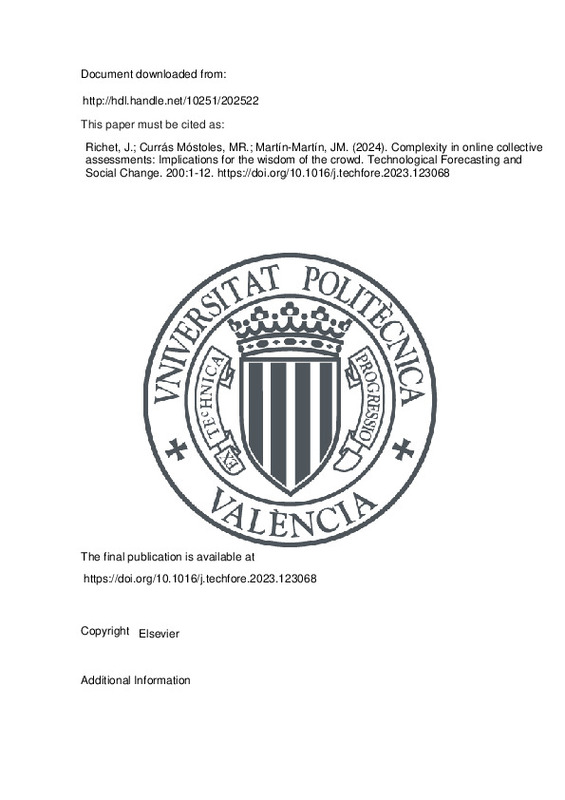JavaScript is disabled for your browser. Some features of this site may not work without it.
Buscar en RiuNet
Listar
Mi cuenta
Estadísticas
Ayuda RiuNet
Admin. UPV
Complexity in online collective assessments: Implications for the wisdom of the crowd
Mostrar el registro sencillo del ítem
Ficheros en el ítem
| dc.contributor.author | Richet, Jean-Loup
|
es_ES |
| dc.contributor.author | Currás Móstoles, María Rosa
|
es_ES |
| dc.contributor.author | Martín-Martín, José María
|
es_ES |
| dc.date.accessioned | 2024-02-09T19:01:56Z | |
| dc.date.available | 2024-02-09T19:01:56Z | |
| dc.date.issued | 2024-03 | es_ES |
| dc.identifier.issn | 0040-1625 | es_ES |
| dc.identifier.uri | http://hdl.handle.net/10251/202522 | |
| dc.description.abstract | [EN] This research investigates how the complex intertwining of multiple assessments influences the way in which scientific consensus and health policy are perceived. We identified an extreme case in France, with its divided political views on glyphosate, which enabled us to highlight unusual variations and develop a richer, more thorough understanding of cognitive biases and complex collective assessments related to health policy. Our sample comprised 51 articles from four major French online media outlets, 2944 user-generated comments (84,386 words), and 52,023 social audience metrics collected during the heated period following the glyphosate renewal decision made by the European Commission, from November 27, 2017, to December 04, 2017. Through a discourse analysis, we uncovered the media articles' discursive strategies. We also explored the embedded usergenerated comments and analyzed collective assessments of glyphosate policy. Our primary contribution lies in developing an understanding of the mechanisms involved in collective assessments of health policy and research consensus. We explored the role played by emotional and moral assessments as antecedents to online polarization. We argue that the complex intertwining of rational, emotional and moral assessments influences how academic consensus is perceived. This research answers the call for more research on the health policy communication process and on the logic of controversy at the interface between politics and science. | es_ES |
| dc.language | Inglés | es_ES |
| dc.publisher | Elsevier | es_ES |
| dc.relation.ispartof | Technological Forecasting and Social Change | es_ES |
| dc.rights | Reconocimiento - No comercial - Sin obra derivada (by-nc-nd) | es_ES |
| dc.subject | France | es_ES |
| dc.subject | Health policy management | es_ES |
| dc.subject | Cognitive bias | es_ES |
| dc.subject | Complexity | es_ES |
| dc.subject | Discourse analysis | es_ES |
| dc.subject | Qualitative research | es_ES |
| dc.subject.classification | FILOLOGIA INGLESA | es_ES |
| dc.title | Complexity in online collective assessments: Implications for the wisdom of the crowd | es_ES |
| dc.type | Artículo | es_ES |
| dc.identifier.doi | 10.1016/j.techfore.2023.123068 | es_ES |
| dc.rights.accessRights | Abierto | es_ES |
| dc.contributor.affiliation | Universitat Politècnica de València. Facultad de Administración y Dirección de Empresas - Facultat d'Administració i Direcció d'Empreses | es_ES |
| dc.description.bibliographicCitation | Richet, J.; Currás Móstoles, MR.; Martín-Martín, JM. (2024). Complexity in online collective assessments: Implications for the wisdom of the crowd. Technological Forecasting and Social Change. 200:1-12. https://doi.org/10.1016/j.techfore.2023.123068 | es_ES |
| dc.description.accrualMethod | S | es_ES |
| dc.relation.publisherversion | https://doi.org/10.1016/j.techfore.2023.123068 | es_ES |
| dc.description.upvformatpinicio | 1 | es_ES |
| dc.description.upvformatpfin | 12 | es_ES |
| dc.type.version | info:eu-repo/semantics/publishedVersion | es_ES |
| dc.description.volume | 200 | es_ES |
| dc.relation.pasarela | S\505977 | es_ES |
| dc.subject.ods | 03.- Garantizar una vida saludable y promover el bienestar para todos y todas en todas las edades | es_ES |







![[Cerrado]](/themes/UPV/images/candado.png)

